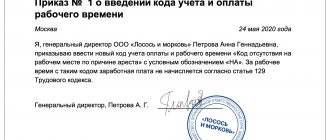Labor discipline is submission to the requirements specified in the Labor Code, the terms of the collective and labor agreement and other local acts, which all employees of the organization must comply with, regardless of position. Violation of them may lead to the imposition of a disciplinary sanction: a reprimand, reprimand or dismissal for the employee, and for the employer this is associated with a violation of the normal functioning of the organization. And here one should act wisely under the slogan “sacrifice the little for the sake of saving the whole.”
Often, the employer violates the procedure for terminating an employment contract, which leads to illegal dismissal and, as a consequence, reinstatement of the employee to his previous position . Dismissal for violation of labor discipline is not an easy task.
It is no secret that issues related to the dismissal of employees always cause the largest number of labor disputes. From the point of view of the Constitution of the Russian Federation and the Labor Code, dismissal is considered a restriction of an employee’s right to work and can only be carried out in accordance with current legislation. So that the manager himself does not have to explain himself in court, he needs to know and remember the relevant provisions of the Labor Code.
What is labor discipline
A disciplined employee complies with the rules and norms of behavior that are established by labor legislation, collective and labor agreements, and local administrative acts of enterprises. An employee does not have the right to violate norms, including those introduced by local acts drawn up directly at the enterprise (for example, labor regulations), in the same way as the norms of labor legislation.
Article 21 of the Labor Code of the Russian Federation establishes a limited list of employee duties, non-compliance with which violates labor discipline.
The internal labor regulations explain to citizens what labor discipline is and the responsibilities of employees and employers.
Collective agreements and other local acts establish:
- procedure for hiring and termination of employment relationships;
- working hours (duration of the working week, working day, availability of breaks and weekends);
- list of positions with irregular working hours;
- duration of the vacation period for different categories of employees;
- procedure and terms of salary payment;
- measures to reward and punish employees.
It is important to record in as much detail as possible the list of obligations in the LNA, the failure to fulfill which will result in penalties. If this is not done, it will be difficult to hold the offender accountable.
Results
Failure by an employee to comply with labor discipline allows the employer to exercise the right to punish him, choosing a measure ranging from educational to radical. However, the entire procedure for issuing a punishment must strictly comply with the law.
Sources:
- Labor Code of the Russian Federation.
You can find more complete information on the topic in ConsultantPlus. Free trial access to the system for 2 days.
What depends on the employer
Labor legislation also establishes obligations for employers to create conditions for compliance with discipline:
- provide employees with work stipulated by the employment contract;
- provide them with equipment, tools, technical documentation and other means necessary to perform their duties;
- ensure safety, security and occupational health;
- pay employees wages in full and on time, etc.
If these conditions are not met, the employee’s violation of the rules of conduct is not considered his fault (for example, if conditions were not created for him to undergo labor safety training).
Calculation
On the last day, the employee must be paid the following:
- wages for the period worked;
- bonuses (if the employee is not deprived of these payments due to compensation for damage to the organization);
- compensation for unused vacation.
The listed payments are mandatory and provided for by law, so the employer cannot deprive the employee of the specified funds. An exception is a premium, which can be used to pay off damage caused to the enterprise (again, if this fact is proven).
The employee is not entitled to any additional payments.
What is a violation of discipline
It is customary to classify examples and consequences of violation of labor discipline according to the severity of the employee’s guilt and the severity of the measures taken. The following types of offenses are conventionally distinguished:
1. Management related to the employee’s failure to comply with subordination:
- ignoring the orders of the manager;
- deliberate failure to comply with instructions and orders.
2. Technological, related to non-compliance with technological standards and working conditions, for example:
- failure to comply with labor safety rules, resulting in an accident or incident;
- release of defective products.
3. Regime related to non-compliance with working hours, for example:
- appearing at the workplace in a state of drug, alcohol or other toxic intoxication;
- absenteeism;
- systematic delays to the beginning of the working day and after the lunch break;
- leaving work early for lunch breaks and at the end of the shift.
Each employee is obliged to comply with work regulations; labor discipline is the main condition for the effective operation of the enterprise.
In addition, according to Art. 81 of the Labor Code of the Russian Federation, punish an employee for the following violations:
- theft of someone else's property;
- embezzlement;
- committing an immoral act if the employee performs educational functions;
- loss of trust if the employee is entrusted with material assets and his actions lead to doubts about his honesty;
- violation of labor protection requirements.
Separately for managers, chief accountants in Art. 81 lists the violations due to which the contract with them is terminated:
- making a decision that was unreasonable in specific circumstances and resulted in damage to the enterprise;
- one-time gross violation of discipline (for a manager).
Each violation entails the collection of supporting documents or an investigation: they are designed to prove the employee’s guilt.
Consequences of violation
As liability for non-compliance with labor rules, the employee is subject to a penalty, the choice of which depends on the severity of the offense:
- comment;
- rebuke;
- dismissal for appropriate reasons.
Application of several penalties for one offense is not allowed.
The Labor Code prohibits the use of penalties not established by law (Part 4 of Article 192 of the Labor Code of the Russian Federation). For example, monetary fines or deprivation (reduction) of bonuses are not used as disciplinary penalties for failure to comply with discipline. Local acts, including orders, on the application of monetary fines are illegal.
As for the option of depriving a bonus as an edifying measure: bonuses, in accordance with the Labor Code of the Russian Federation, are an incentive payment and not a penalty measure. But if the enterprise has a bonus system, then the regulations on bonuses provide for which the employee’s bonus is reduced or not paid in full. One of these conditions is failure to fulfill duties. In this case, the local act on bonuses must establish the conditions and procedure, including documentation, in accordance with which the amount of the bonus is reduced or the employee is deprived of the bonus completely.
The procedure for dismissal for repeated failure to fulfill job duties
Determine whether the employee violated labor duties
If an employee has not fulfilled a specific obligation stated in the employment contract, job description, or local regulations, which he is obliged to comply with, dismissal on the grounds in question is possible.
If an employee has violated a duty that does not relate to his official duties and is not enshrined in the listed documents, the employee cannot be dismissed for failure to fulfill job duties.
Conclusion: it is necessary to have employment contracts with employees with detailed job responsibilities or separately developed job descriptions, internal labor regulations, which must be familiarized to the employee upon signature.
Record the fact of repeated failure to fulfill labor duties
Failure to perform duties will be grounds for dismissal if a year has not passed from the date of prosecution for failure to perform official duties.
Failure by an employee to fulfill his duties can be recorded and documented using: a memo, a relevant act, or a commission conclusion.
These documents should indicate:
- what offense did the employee commit?
- the date of its commission,
- Full name, position and signature of the person who drew up the relevant document;
- date of preparation of this document.
Request an explanation from the employee
The corresponding requirement should be made in writing and familiarized with it to the employee against signature. If the demand cannot be served in person, it should be sent by mail to the employee’s address. It is better to send the request by registered mail or valuable mail with a list of attachments, with acknowledgment of delivery. The letter must indicate the period within which the employee must provide explanations.
According to Part 1 of Art. 193 of the Labor Code of the Russian Federation, the employee must provide an explanation within two working days . If an employee has not fulfilled his job duties for good reasons or has provided exculpatory documents confirming his innocence, then he cannot be dismissed on the grounds in question.
If the employee has not provided any explanations, then the employer must draw up a corresponding act. It is worth noting that the employee’s failure to provide an explanation is not an obstacle to applying a disciplinary sanction such as dismissal (Part 2 of Article 193 of the Labor Code of the Russian Federation).
Issue and register an order to terminate the employment contract
An order of dismissal can be issued in the form approved. Resolution of the State Statistics Committee of Russia dated January 05, 2004 No. 1 (form No. T-8 and form No. T-8a) or according to an independently developed form.
The basis states “repeated failure by an employee, without good reason, to fulfill his job duties if he has received a disciplinary sanction, paragraph 5 of part one of Article 81 of the Labor Code of the Russian Federation.”
The line “Document, number and date” of this order indicates the employee’s memos, acts and explanatory notes.
The mere fact of a gross violation of discipline does not predispose the authorities to show patience with the offender. But if the situation requires consideration or investigation, then the employer must remember that the law gives him only thirty days from the moment the offense was discovered , Art. 193 Labor Code of the Russian Federation.
This means that the employer will not be able to threaten dismissal and keep the employee in constant tension. The law says: either a proportionate punishment within a month, or complete forgiveness of the offense.
Those employees who plan to hide from the wrath of management on vacation or on sick leave should know that these periods are excluded from the period allotted for making a decision on the fate of the negligent employee, Art. 193 Labor Code of the Russian Federation. That is why, after a sudden exacerbation of chronic illnesses, no matter how long it lasts, the hired person will have to give written explanations about the reasons for his behavior.
The order must be registered in the Register of Orders (Instructions) or in another manner established by the employer.
Familiarize the employee with the order to terminate the employment contract against signature
If the employee demands to be given a duly certified copy of the order to terminate the employment contract, then the employer is obliged to do so.
If the order cannot be brought to the attention of the employee or the employee refuses to read it under signature, then an appropriate entry must be made on the order. In addition, you need to draw up a report on the impossibility of familiarizing the employee with the order (or on the employee’s refusal to familiarize himself with the order).
Submit a SZV-TD on the dismissal of an employee
Regardless of the method of maintaining the work book of a dismissed employee, the employer is obliged to submit to the Pension Fund information about his dismissal in the form SZV-TD, approved. Resolution of the Board of the Pension Fund of the Russian Federation dated December 25, 2019 No. 730p (clause 2.4 of Article 11 of the Federal Law dated April 1, 1996 No. 27-FZ). Information must be submitted no later than the working day following the day the dismissal order is issued .
Make an entry in the employee’s personal card
Unified forms of personal cards were approved by Decree of the State Statistics Committee of Russia dated January 5, 2004 No. 1. Form No. T-2 is intended for commercial organizations, form No. T-2GS (MS) is for state and municipal employees.
In the line “Grounds for termination of the employment contract (dismissal)” of Section XI of the personal card, an entry is made in accordance with the dismissal order. In this case, you must indicate:
“The employment contract was terminated due to the employee’s repeated failure to fulfill labor duties without good reason if he had a disciplinary sanction, paragraph 5 of part one of Article 81 of the Labor Code of the Russian Federation.”
The entry in the personal card must be familiarized to the employee against his signature . In case of refusal of the employee, it is necessary to sign the person responsible for personnel records, and also draw up a corresponding act.
A bill amending the procedure for maintaining paper work records is currently under consideration. In accordance with the innovations, it is planned to abolish the norm obliging the employee to familiarize himself with each entry in the labor record. If they are accepted, there will be no need to sign the card.
Enter a notice of dismissal in the work book
This point must be fulfilled only if the employee’s work book is kept on paper (Article 66 of the Labor Code of the Russian Federation). If the work book is kept in electronic form (Article 66.1 of the Labor Code of the Russian Federation), an entry about dismissal is not made, since the work book is kept by the employee. In this case, information about dismissal is reflected only in the report in the SZV-TD form.
Make final settlement with the employee
Of course, dismissing an employee for failure to comply with labor discipline is not the most pleasant procedure, first of all, for him. However, this does not mean that a person can be deprived of everything he has earned during the time he devoted to the company.
Whatever article is specified in the order to terminate the employment relationship, the employee has the right to:
- current salary;
- compensation for vacation (main, additional, special);
- reimbursement of overexpenditures on accountable amounts;
- bonuses for exceeding the norm, if established;
- payment for overtime hours and time worked on holidays and weekends;
- all bonus payments stipulated under a collective agreement or other local act, unless they are made dependent on the reason for dismissal.
On the day the employee is dismissed, a final settlement must be made with him (Part 1 of Article 140 of the Labor Code of the Russian Federation). In cases where an employee does not work on the day of dismissal, payment must be made to him no later than the day following the day the employee submits a request for payment (Part 1 of Article 140 of the Labor Code of the Russian Federation).
Provide the employee with work-related documents
An employer, wishing to punish an employee more severely, cannot refuse to issue timely employment documents, required certificates and copies. He is obliged to provide all other documents that the former employee may require in the future. On the day of termination of the employment contract with the employee, he is given:
- work book - if the work book is kept on paper in accordance with Art. 66 of the Labor Code of the Russian Federation (Part 4 of Article 84.1 of the Labor Code of the Russian Federation);
- information about labor activity in the form STD-R, approved. by order of the Ministry of Labor of Russia dated January 20, 2020 No. 23n - if the work book is kept in electronic form in accordance with Art. 66.1 of the Labor Code of the Russian Federation (Part 4 of Article 84.1 of the Labor Code of the Russian Federation);
- copies of personalized accounting information (Article 4, Article 11 of the Federal Law of April 1, 1996 No. 27-FZ). For the dismissed employee, you need to prepare an extract from SZV-STAZH, section 3 of the calculation of insurance premiums, containing information specifically about him.
- a certificate of the amount of earnings and other payments for which insurance premiums were calculated for the two calendar years preceding the year of dismissal for the subsequent assignment of benefits to the former employee at a new place of work.
When penalties are not applied
The law does not establish preferential categories of workers who cannot be held accountable for violation of discipline. But there are procedures for applying penalties and deadlines that must be observed.
At the same time, it is necessary to take into account guarantees for certain categories of workers.
Example:
A pregnant woman, according to Art. 261 of the Labor Code of the Russian Federation, it is impossible to dismiss at the initiative of the employer, except in cases of liquidation of the enterprise. But this does not mean that one should turn a blind eye to the violation. It is necessary to use other collection measures.
For guilty actions, the employer holds the employee accountable, including dismissal, if this is provided for by the norms of the Labor Code of the Russian Federation. Even if as a result the employee loses some benefits.
The Constitutional Court of the Russian Federation, in its ruling dated June 23, 2015 No. 1243-O, recognized the dismissal of an employee for absenteeism as legal, as a result of which she will lose the housing received under the target program, as she will lose her benefits.
In addition, penalties cannot be applied if deadlines are missed.
Rewards and punishments
In Art. 191 of the Labor Code of the Russian Federation talks about incentives for work. They are defined as:
- Gratitude;
- bonuses;
- giving a gift;
- presentation of a certificate of honor;
- nomination for the title of best in the profession.
Other types of incentives may be reflected in local documents: PVTR, collective agreement, in addition, in disciplinary statutes and regulations approved by the Government for special categories of employees. Outstanding labor achievements may be recognized with state awards.
Penalties for negligent workers are strictly limited. The employer has the right:
- make a remark;
- reprimand;
- dismiss the employee.
The use of arbitrarily invented punishments, for example, fines for poor performance, reduction of rest time, is illegal. Certain categories of employees may be subject to additional penalties in accordance with industry and intersectoral statutory documents and regulations.
On a note. Separate categories include railway workers, employees of paramilitary mine rescue groups, customs officers, nuclear workers, sailors, and maritime workers. The effect of professional statutes and regulations does not apply to all workers in the industry, but only to those whose professional actions are potentially dangerous.
Deadlines
The announcement of a reprimand or reprimand, an order of dismissal for violations is issued no later than a month from the day they learned about the incident. Missing this deadline removes responsibility from the violator. If information about a violation is made public, six months have already passed since its commission, it is also impossible to punish the offender.
The penalty is lifted automatically if the citizen is no longer subject to disciplinary action within a year. The employee has the right to petition for the removal of the punishment before this period. The employer makes a decision on this issue independently, at the request of the immediate superior and the petition of the representative body.
Trial
A person who has lost his job can file a claim in court. If, in his opinion, the boss’s actions were absolutely illegal and unlawful, he can demand that the decision on dismissal and reinstatement be canceled. In some cases, the court does take the side of the injured party, but each case must be considered individually.
Controversial issues that may affect the course of the proceedings are:
- incorrect procedure for recording violations and absenteeism;
- the information indicated in the report is unreliable (often management overestimates the time of lateness or absence);
- absence of a written request from the manager to provide an explanatory note.
Failure to comply with the deadlines established by law is also considered a gross violation. If more than 1 month has passed since the date of the offense committed, which was known to management, the statute of limitations is considered expired. When the court satisfies the plaintiff’s demands, the employer will be obliged to reinstate him in his previous position. The period of absence is counted as forced downtime and is necessarily included in the length of service when calculating wages. An employee has the right to demand compensation for moral damage, as well as ask the director to transfer him to another branch or division.
The decision on what punishment to apply must be made by the owner, but his conclusions cannot contradict the law. To avoid conflict situations and properly fire a dishonest subordinate, you need to take into account all the nuances of the contract termination procedure. Otherwise, the court may take the employee’s side, even if he is truly guilty.






